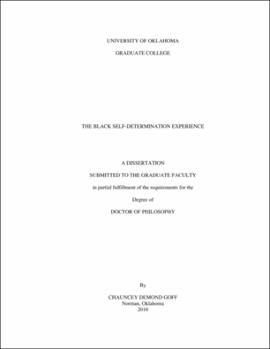| dc.description.abstract | For over four decades, America's educational system has overrepresented Black students in its special education programs. To little avail, and no avail if discussing a decrease in the disproportionate rates America identifies and refers the Black student for special education services, many authors have addressed the overrepresentation phenomenon. In fact, many authors have produced educator and system oriented initiatives, which omit the Black student from being a solution to his or her very own special education overrepresentation, might actually disempower Black students, and might actually perpetuate overrepresentation. The Black Self-Determination Experience sought to capitalize on research that demonstrated that empowered Black students with a sense of control over their education and destiny produce the in-school and postschool transition outcomes that dissuade special education placement. The Black Self-Determination Experience included eight distinct research questions to achieve four specific goals that together realize the vision of empowering Black students to assume, demonstrate, and experience control over their education and destiny. To do so, the Experience concentrated on the enhanced self-awareness that produces the authentic self-determination that then might enable America's Black students to address their special education overrepresentation. The Experience included five Black students both with and without IEPs, four parents and one legal guardian, and employed mixed methodology. Results indicated the Experience to be an effective self-determination curriculum, for each student exited (a) having learned essential Experience content knowledge, (b) professing feeling more self-determined, (c) better understanding their academic identity, and (d) believing that others should have The Black Self-Determination Experience. | |
